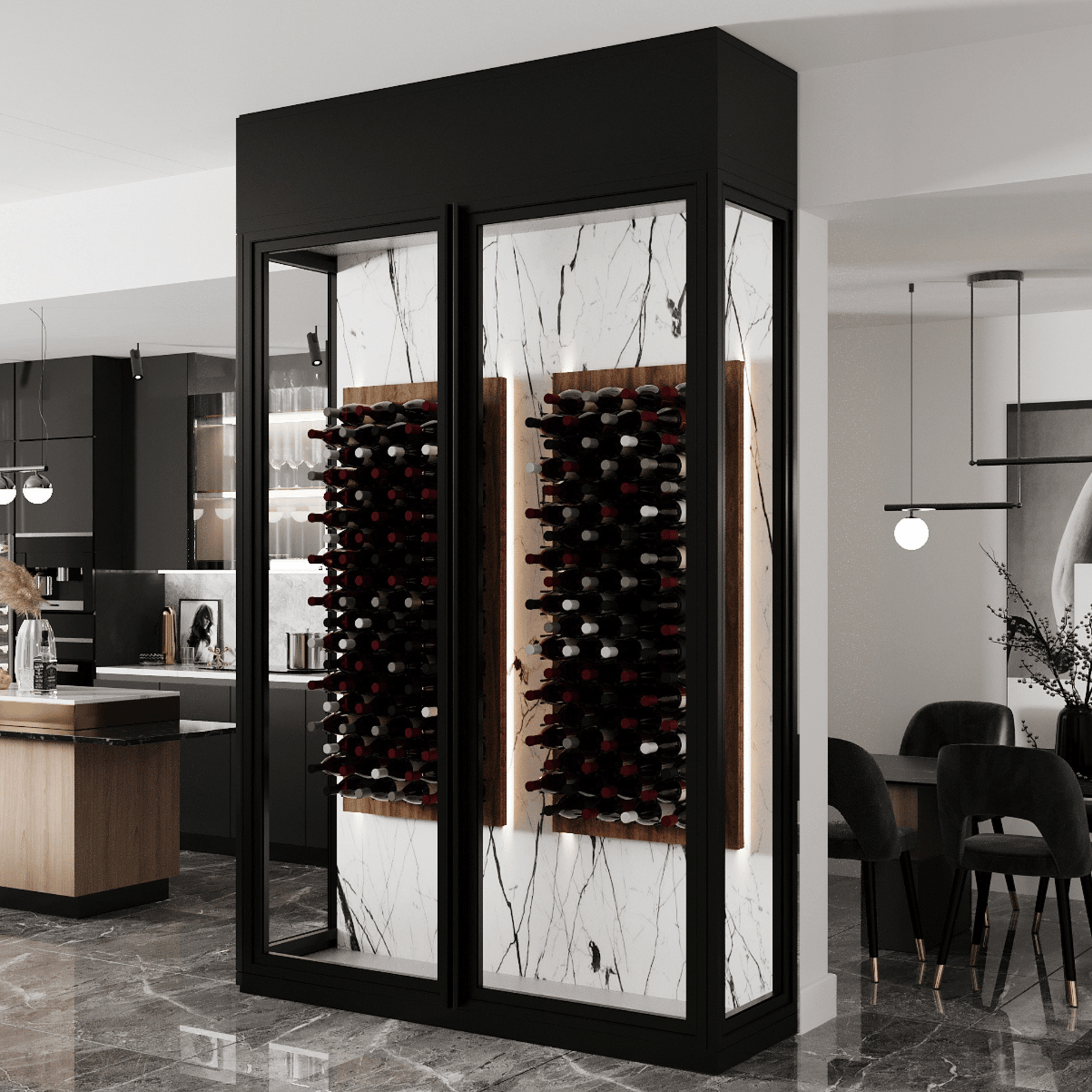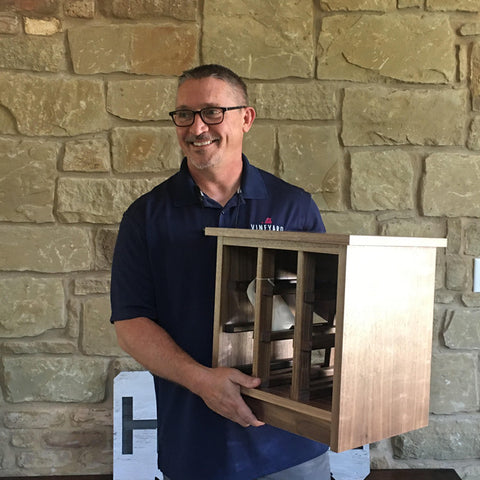Once the envy of Hollywood celebrities and Michelin-starred restaurants, glass wine cellars now grace the homes of passionate collectors everywhere. These modern wine cellars showcase prized wine bottles with breathtaking clarity, transforming living spaces into sophisticated display areas. But before investing in this aesthetic wine storage solution, it's crucial to understand the challenges of glass wine cellars and practical solutions to mitigate them.
What is a glass wine cellar?
A glass wine cellar is a wine storage room or enclosure made entirely or partially of glass. They are becoming increasingly popular due to their modern and visually appealing design. They can be customized to fit any space and showcase your wine collection in a visually stunning way.
Glass Wine Cellars Challenges and Solutions
Like their traditional counterparts, these modern wine glass cellars also have hurdles. It's important to note that these challenges can be mitigated by taking specific measures and implementing practical solutions.
Absorbs Heat
Unlike concrete or wood, glass readily conducts heat. This can affect climate control, exposing your precious vintages to harmful fluctuations.
Solutions:
- Double-paned glass with an insulating layer provides extra protection.
- Efficient cooling systems (maintaining around 55 degrees Fahrenheit).
- Strategic placement away from direct sunlight.
Humidity Horrors
Retaining the delicate humidity balance (50-70%) is vital for preventing oxidation and mold growth. Glass walls may trap moisture, lead to higher humidity, or allow excessive evaporation, causing dryness.
Solutions:
- Humidity monitoring systems
- Well-placed dehumidifiers
- Proper ventilation
- Wine cellar cooling units like WhisperKOOL keep the ideal humidity level.
Light Exposure
Ultraviolet rays accelerate wine aging, compromising their quality. While the visual appeal of a glass wine enclosure display is undeniable, remember your wines need to be kept in a cool, dark place.
Solutions:
- Use tinted, double-pane, or strategic UV filters to shield your collection.
- Controlled lighting systems minimize exposure, allowing you to set a good ambiance in the cellar without compromising your wine.
Condensation Conundrum
Cold temperatures inside meet warm, humid air outside, leading to condensation on the glass. This not only affects aesthetics but also creates a breeding ground for mold.
Solutions:
- Proper ventilation and air circulation, ensuring consistent temperatures and minimizing moisture buildup.
- Regular cleaning and maintenance will keep your glass walls sparkling and your cellar environment healthy.
Cost Considerations
Most glass wine cellars are on the luxurious side. Stronger insulation, specialized cooling systems, and high-quality glass contribute to the higher cost than traditional options.
Solutions:
- Weigh the aesthetic appeal against your budget and commitment.
- Invest in trusted brands like Vitrus glass-enclosed wine cellars that provide uncompromising quality and distinct cooling capabilities. Reliable brands also help reduce maintenance or replacement costs.
Poor Noise Reduction
Glass, while beautiful, has poor sound absorption, which means a noisy cooling system can become a nuisance.
Solutions
When selecting your wine cellar cooling system, go for those with quiet operation or minimal noise for a peaceful wine display and storage.
Air Leaks
The joints of the glass paneling may not always be airtight. This gap is creating an unfavorable and unsuitable environment in the cellar.
Solutions:
- Professional installation and sealing.
- For a custom glass wine cellar, use weather stripping to seal.
- Choose glass wine cellars with robust structures, fully concealed door hinges, and airtight seals.
5 Advantages of Glass Wine Cellars

Glass wine cellars offer more than stunning beauty to your home or business. Here are 5 benefits of a glass cellar:
- Showcase your collection. Your prized vintages are bathed in light and beautifully displayed for admiration. Glass walls transform your cellar into a gallery, allowing you and your guests to appreciate your collection.
- Enhanced ambiance. Let natural light flood your cellar, creating an inviting and sophisticated atmosphere. This makes the space more enjoyable for both casual relaxation and entertaining guests.
- Space optimization. Glass walls visually expand the perceived size of your cellar, making it feel airy and spacious, even in smaller areas.
- Improved monitoring. Keep an eye on your wines at a glance. The transparency of glass allows you to quickly check on any potential issues, ensuring the ideal environment for your collection.
- Increased value. A well-designed glass wine cellar can be a significant selling point, potentially adding value to your property.
FAQs about Wine Cellars
What makes an ideal wine cellar?
An ideal wine cellar combines five key elements:
- Consistent Temperature. Aim for a cool, stable temperature between 53-57°F (12-14°C) with minimal fluctuations.
- Controlled Humidity. Maintain 55-70% humidity to prevent cork shrinkage and mold growth.
- Minimal light exposure. Shield your wines from harmful UV light, which can accelerate aging and degrade flavor.
- Good Ventilation. Ensure proper air circulation to prevent stagnant air and potential odors.
- Vibration Control. Minimize shakings that can disturb sediment and affect wine quality.
Ultimately, the ideal setup may vary based on your wine collection and budget, but focusing on these core elements will create a haven for your prized vintages.
What kind of glass do you use in a wine cellar?
There are two main types of glass used in wine cellars.
- Single-pane glass: This is the most affordable option, but it offers the least insulation and is more susceptible to temperature fluctuations and condensation.
- Double-pane glass: This type of glass has two panes separated by an insulating layer, making it more energy-efficient and better at maintaining a consistent temperature and humidity. It is also less prone to condensation.
Some considerations when choosing glass include:
- Thickness: Thicker glass provides better insulation.
- Coating: Low-emissivity or Low-E coatings can improve insulation and reduce UV light penetration.
- Tinting: Tinted glass can help block UV light and add privacy.
How much does a small glass wine cellar cost?
The cost of a small glass wine cellar varies depending on several factors, including:
- Size: Smaller cellars are generally cheaper than larger ones.
- Type of glass: Double-pane glass is more expensive than single-pane glass.
- Features: Additional features like lighting, ventilation, and cooling systems can significantly increase costs.
- Installation: Professional installation can add to the total cost.
Providing a specific price range requires knowing your preferences. Check out our blog, How Much Does It Cost to Build a Wine Cellar, for an overview. Or ask for a FREE design quote from our experts.
What is a good size for a wine cellar?
The ideal size for a wine cellar depends on several factors, such as:
- The size of your wine collection: How many bottles do you currently own, and how much do you plan to expand your collection?
- Your budget: Larger cellars are typically more expensive.
- Available space: Do you have a dedicated room for a wine cellar, or will it be integrated into another space?
- Your personal preferences: Do you want a small, intimate space or a larger, more showcase-style cellar?
There is no one-size-fits-all answer to this question. However, most experts recommend starting with a cellar that can accommodate your current collection with some room for growth.
Takeaway
Glass wine cellars captivate with their visual magnetism but come with challenges. Luckily, solutions also abound. Ultimately, the ideal glass wine cellar balances elegance with functionality. By addressing these challenges and following proactive solutions, collectors can ensure their glass cellars remain a haven for their precious investment.
How do you store your wine collection?
Contact our customer service team if you have questions about building your ideal wine cellar.


